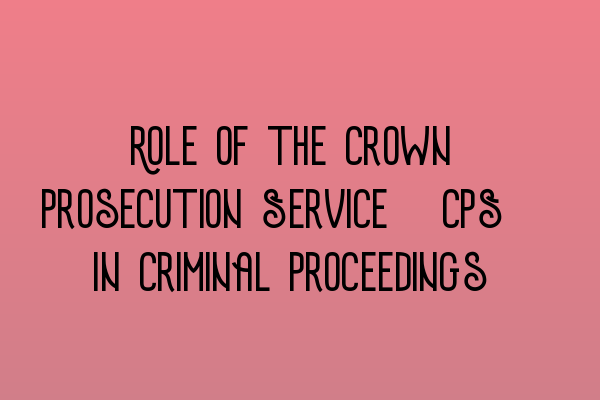Role of the Crown Prosecution Service (CPS) in Criminal Proceedings
Welcome to SQE Criminal Law & Practice Law UK! In this article, we will discuss the crucial role of the Crown Prosecution Service (CPS) in criminal proceedings. The CPS is responsible for prosecuting criminal cases in England and Wales, and understanding their role is essential for anyone involved in the legal profession.
What is the Crown Prosecution Service (CPS)?
The Crown Prosecution Service (CPS) is an independent prosecution authority that acts in the public interest to bring criminal charges against individuals accused of committing offences. Their primary role is to review and assess evidence collected by the police or other investigative agencies and decide whether there is enough evidence to pursue a criminal prosecution.
The CPS operates on behalf of the Crown, which represents the state and the public. It plays a crucial role in ensuring that justice is served by presenting the case effectively and fairly in court.
Key Responsibilities of the Crown Prosecution Service
The CPS has several key responsibilities in criminal proceedings:
- Evidence Review: The CPS carefully reviews the evidence collected by the police or other agencies. This includes witness statements, forensic reports, and any other relevant information necessary for a fair prosecution.
- Decision-Making: Based on the evidence review, the CPS makes an informed decision on whether to charge the suspect with a criminal offence. This decision is based on the Code for Crown Prosecutors, which sets out the legal tests for prosecution.
- Preparing for Trial: If the CPS decides to proceed with a prosecution, they must prepare the case for trial. This involves gathering additional evidence, interviewing witnesses, and coordinating with other experts or professionals involved in the case.
- Presenting the Case: During the trial, the CPS acts as the advocate for the prosecution. They present the evidence before the court, examine witnesses, and argue the case against the defendant.
- Securing Convictions: The CPS’s ultimate goal is to secure convictions and ensure that justice is served. They work closely with the police and other agencies to gather strong evidence and build a compelling case.
Collaboration within the Criminal Justice System
The Crown Prosecution Service collaborates with various organizations and individuals within the criminal justice system. This includes:
- Police: The CPS relies on the police to gather evidence and conduct investigations. Close collaboration between the CPS and the police is vital for building a solid case.
- Defense Lawyers: Defense lawyers play a crucial role in ensuring a fair trial. The CPS shares the evidence they have collected with the defense, and both sides work within the legal framework to present their case.
- Judges: Judges oversee the trial process and provide legal guidance. The CPS respects the independence of the judiciary and works within the established legal principles and procedures.
Conclusion
The Crown Prosecution Service (CPS) plays a vital role in the criminal justice system of England and Wales. They are responsible for reviewing evidence, making decisions on prosecution, preparing cases for trial, and representing the prosecution in court. Effective collaboration with the police, defense lawyers, and judges is essential for ensuring justice is served.
To learn more about criminal law and prepare for the SQE exams, check out our SQE 1 Practice Exam Questions and SQE 1 Practice Mocks FLK1 FLK2 articles. We also offer SQE 2 Preparation Courses and SQE 1 Preparation Courses to help you excel in your studies. Stay updated with the latest SRA SQE Exam Dates to ensure you’re on track with your legal career.
